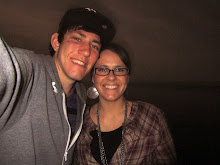I love the people here in
Helping them fix their problems isn't as easy as it sounds though. Volunteering at BYU's Center for Economic Self Reliance for the past year I thought I had gained a relatively good grasp on development work and what idea's seem to be working and which ones don't. Since I've been here in
I think that is one of the hardest things; I want to leave here feeling like I have made a sustainable difference in these people's lives but if anything I work on becomes sustainable it is going to be because the people here choose to make it so. Some of the people here have a very good grasp on that; they know that if
Take this mushroom house I was visiting the other day for example -- This mushroom house was built last year by the HELP International team but unfortunately because of the rough weather the plastic on the top tore letting water into the growing area. Instead of fixing the mushroom house themselves they waited for us to come back and do it for them. I can't help but think what if we didn't come back? Why aren't they creating a fund from their profits that would go just towards repairs? It's hard because the group that the mushroom house was built for is and AIDS clinic that has been a huge benefit to the community so of course we want to help them but if they aren't building on top of what we have already given them then we aren't doing anyone any good.
That is one reason I am so excited to be working with my friend Paul and the Buikwe Village Care (www.buikwevillagecare.org). Paul started Buikwe village care a couple years ago with the intent to use local people and local resources to fix local problems. Perhaps his biggest undertaking has been the support of a school for orphans and children whose parent's can't afford to send them to school. Each of the teachers at the school are volunteers from the local community who only get paid on the rare occasion that the school comes across some money. On top of the school Paul also works with seven different villages who meet on a weekly basis to discuss problems in their communities and how they can can fix them.
We have spent the last week building a mushroom house for one the villages that Paul works with. We have spent almost the whole summer getting ready for this project, from training the village members how to take care of the mushroom house to teaching them general business skills including booking keeping and budgeting.
We chose to build them a mushroom house because mushroom's have become a very profitable business as of late here in eastern Africa, a market that has hardly been tapped here in Uganda. He have come in contact with several buyers in the capital of
Mushroom houses can provide the owner with an average of about 30 dollars a day of income, about 30 times the average income. Since our mushroom houses will be divided among groups of 15 the income will not be quite so high but collectively it will make a huge difference.
Lubanyi, the village we are working with, has agreed that 15% of their net income will be donated to building the next 6 mushroom houses in the other villages that Paul work's with. Each of the subsequent villages have agreed to these terms as well. Once each of the villages have received their own mushroom houses they will all be required to donate 10% of their income to BVC for the creation of additional sustainable income generating projects.
Working on the mushroom house with the villagers of Lubanyi was an awesome experience. Let's be honest, they did most the work which I think is how it should be. That way they own the project and really take care of it. The construction took a total of 3 days and now all we have to do is plant the mushrooms which is on the calendar for tomorrow.
 Unloading the supplies to build our mushroom house
Unloading the supplies to build our mushroom house The first day we finished the frame.
The first day we finished the frame.  The second day we had to take a break while we were waiting for one of our partners to get there. The women made us banana leaf skirts and taught us to dance.
The second day we had to take a break while we were waiting for one of our partners to get there. The women made us banana leaf skirts and taught us to dance. You have to cover the inside with plastic so that it stays dark and humid
You have to cover the inside with plastic so that it stays dark and humid Then you cover the outside and roof with papyrus mats.
Then you cover the outside and roof with papyrus mats. And there you have it. A mushroom house that has the potential to
And there you have it. A mushroom house that has the potential to start the path to overcoming poverty.


No comments:
Post a Comment